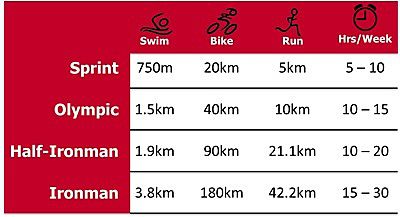Beginner triathletes can be classified roughly into two groups. The first one is made up by people who are nervous about the whole thing and don't know where to start on what feels like a monumental challenge. The second group is the exact opposite, people who are over confident because they might have participated in another type of event and they think it might be similar to what they have done before (e.g. "I’ve run a 5k before and the triathlon ends with a 5k, right? I can totally do this").
Starting with triathlon is possible for anyone as long as the right expectations and goals are set with an honest evaluation of fitness and commitment to train. Even with zero endurance background, a little dedication and commitment will go a long way. Taking it one step at a time with a structured plan will have any beginner pleasantly surprised by the perks of becoming an endurance athlete. I love triathlon because it enables people to make new friends with some of the finest people around, feel stronger than ever before, and gain incredible self-confidence.
If you-re reading this and wondering about becoming a triathlete, these are the two basic pillars on which you can base your decision which will keep you clear and motivated:
1. Be clear on why you want to do it.
Having a clear goal will keep you in track and will be the main driver for training. Find your inspiration and follow it. It could be losing some weight, gaining confidence, or even just brag about completing one of the most demanding sports in the planet.
2. Choose your distance honestly.
You should be realistic about your goals, how much you are prepared to commit to training, and your general state of fitness. If you have never done anything sporty or have been away from the gym for a while, your best bet is probably a sprint distance or even a super sprint. If you are a current athlete and are feeling brave, you could set your goal for an Olympic distance. Ironman and 70.3 distances should be reserved to either really seasoned athletes or people willing to invest huge amounts of dedication and intense work. More distance doesn’t make you a better athlete, it is always better to do well in smaller distances and then graduate to more difficult races, otherwise you will not enjoy the race and will probably get injured. If it helps, here is a chart on how many hours an athlete will need to invest per week to prepare for each distance:
3. Find a program that works for you.
If you are a beginner, your best bet is to find a coach or at least training group to guide you through the motions. The advantages of a coach will be a program fitted to your specific needs and capacities, you will get specific corrections to your technique, close monitoring to your progress, and access to an expert 24/7.
Training for an event should take up anywhere from 8-12 weeks prior to the event. Usually a good program for people with a regular job considers short strength and technique sessions for all three disciplines spread throughout the week and longer sessions during the weekend for endurance. Remember that resting periods and easy sessions are just as important as the hard parts, recovery is key when training for endurance. As a reference a basic training week for an Olympic triathlon normally looks like this:
• Day 1: 25 – 30 minute swim / 30 minutes Strength Training
• Day 2: 25 – 30 minute run / 30 – 40 minute bike session or spin class
• Day 3: 25 – 30 minute swim / 30 minutes Strength Training
• Day 4: 45 minutes brick sessions (combining bike + running drills)
• Day 5: Easy long run 1hr + 30 min Swim session
• Day 6: Easy long bike ride for 1.5 hours
• Day 7: REST, maybe stretch a little or get a sports massage
Keep your goals in mind during these days. Getting started can be a bit hard, but once you get the ball rolling you will start enjoying them a lot. You should start seeing results pretty soon, and that is the best reward.
4. Get the right equipment.
Triathlon equipment may look like an expensive investment, but it doesn’t have to be. As a beginner you should look for equipment that is both comfortable and that you like. High performance equipment yields results only when you have already mastered the basics, so don’t sweat it if you don’t get an aero helmet or wheels on your first bike. You can even rent some of the things or you can borrow them from a friend who’s done this before. These are the basic things you need to get started in each discipline:
a. Swimming: swimsuit, goggles, and a swim cap
b. Cycling: A road bike, a helmet, and some bike shorts
c. Running: a comfortable pair of running shoes
Finally, just start. Every journey begins with the first step. Trust yourself and you will soon start uncovering your potential. Getting started is the hardest part, but once you do make an appointment to yourself every day and work on getting stronger.